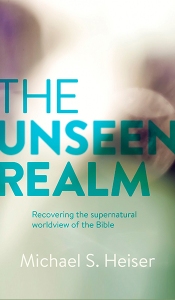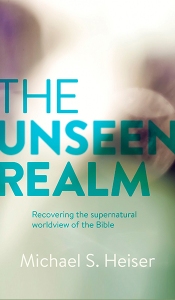 Michael S. Heiser, The Unseen Realm: Recovering the Supernatural Worldview of the Bible (Bellingham, WA: Lexham Press, 2015). Hardcover | Kindle
Michael S. Heiser, The Unseen Realm: Recovering the Supernatural Worldview of the Bible (Bellingham, WA: Lexham Press, 2015). Hardcover | Kindle
The Bible both assumes and articulates a supernatural worldview. From the “In the beginning” of Genesis to the “Amen” of Revelation, mention of God and divine action is heard on each page. All Bible-believing Christians are thus supernaturalists.
Modernity assumes and articulates a worldview of naturalism. In this view worldview, reality is a closed nexus of material cause and effect. No God transcends this nexus nor intervenes within it.
Contemporary Bible-believing Christians thus feel the tension between their supernaturalist theological convictions and their naturalist cultural context. Desiring to minimize this tension, they offer a thin account of biblical supernaturalism, which retains belief in God and miracles but downplays other aspects of what Michael S. Heiser calls “the unseen realm.”
In The Unseen Realm, Heiser sets out to provide a thick description of biblical supernaturalism. He describes the “real focus” and “theological center” of the Bible in this way:
The story of the Bible is about God’s will for, and rule of, the realms he has created, visible and invisible, through the imagers he has created, human and nonhuman. This divine agenda is played out in both realms, in deliberate tandem.
Heiser is Scholar-in-Residence at Faithlife, the parent company of Logos Bible Software. He has an MA in Hebrew Studies and a PhD in Hebrew Bible and Semitic Languages from the University of Wisconsin-Madison. The topic of his dissertation was, “The Divine Council in Late Canonical and Non-Canonical Second Temple Jewish Literature,” a topic of importance to the book.
Psalm 82:1 sparked Heiser’s interest in the unseen realm. “God has taken his place in the divine council; in the midst of the gods he holds judgment…” (ESV). The English words God and gods translate the same Hebrew word, elohim. “The singular elohim of Israel presides over an assembly of elohim,” Heiser writes.
Heiser names this “ the ‘divine council worldview’ of the biblical writers,” which he explains this way:
This phrase and others like it refer to God’s rule over all things, visible or invisible, through his intelligent agents—his imagers—both human and nonhuman. Since…it was God’s original intention for humanity (and thus humanity’s original destiny) that they rule and reign with him as part of his heavenly nonhuman household, human affairs are encompassed in the divine council worldview. In biblical theology, there is a symbiosis of both realms, whether in loyal service to God, or in spiritual conflict in the wake of divine and human rebellion.”
In addition to the divine council worldview, Heiser writes about “the Deuteronomy 32 worldview,” also called “the cosmic-geographical worldview.”
The Old Testament…describes a world where cosmic-geographical lines have been drawn. Israel was holy ground because it was Yahweh’s “inheritance,” in the language of Deuteronomy 32:8–9. The territory of other nations belonged to other elohim because Yahweh had decreed it. Psalm 82 told us that these lesser elohim were corrupt. We aren’t told how the elohim Yahweh assigned to the nations became corrupt, only that they were. It is clear from Deuteronomy 4:19–20; 17:3; 29:25; and 32:17 that these elohim were illegitimate for Israelite worship.
The Unseen Realm traces these divine-council and cosmic-geography themes throughout Scripture, largely following the biblical narrative of creation, fall, redemption, and glorification.
Heiser uses this supernatural worldview to explain features of the biblical text that leave readers scratching their heads—for example, the Nephilim of Genesis 6:1–4, the “angel of the Lord” in the Pentateuch, the pattern of destruction in Joshua’s conquest of Caanan, the “prince of the kingdom of Persia” and “Michael” in Daniel 10, the “Son of Man” sayings in the Synoptic Gospels, Paul’s reference to “cosmic powers” and “spiritual forces” in Ephesians 6, the “harmagedon” (i.e., Armageddon) of Revelation 6, among many others.
In any book covering as much biblical territory as Heiser’s does, readers will find interpretations of specific passages they disagree with. Not everyone—neither scholar nor layperson—will agree with every jot and tittle of Heiser’s argument. Nonetheless, as a whole, Heiser’s thick description of the biblical worldview is both exegetically interesting and spiritually suggestive. The Unseen Realm is an eye-opening book. Once you see the Bible as Michael Heiser sees it, you will find it difficult to un-see it that way.
Two questions arise:
First, is Heiser suggesting that the biblical worldview is polytheistic? The answer is no. “When we see the word God,” Heiser writes, “we instinctively think of a divine being with a unique set of attributes—omnipresence, omnipotence, sovereignty, and so on. But this is not how a biblical writer thought about the term. Biblical authors did not assign a specific set of attributes to the word elohim.” Instead, “What all the figures on the list [of beings referred to in the Bible as elohim] have in common is that they are inhabitants of the spiritual world” (emphasis in original). Israel’s elohim—whose name is Yahweh—sits enthroned as sovereign over this divine council. “The Old Testament writers understood that Yahweh was an elohim—but no other elohim was Yahweh.”
If it helps you better understand Heiser’s point, think of the elohim (“gods”) as angels of varying ranks. Doing so reinforces the theological distinction between God and his spiritual creations. Unfortunately, given how many Christians think of angels (as fat little babies with wings), it minimizes the power Scripture attributes to those beings, as well as the depths of the conflict between God and the Church, on one side, and the fallen elohim on the other.
Which brings us to the second question: Is Heiser talking about strategic-level spiritual warfare? This practice, popular in some Pentecostal and charismatic circles, focuses on taking dominion over “territorial spirits” through prayer. My guess is that advocates of this form of spiritual warfare use Heiser’s research to buttress their distinctive practices.
If I read Heiser correctly, however, the answer once again is no. Heiser’s book explicates the divine council worldview in terms of mainstream biblical scholarship. It does not articulate a practical theology of spiritual warfare. At the outset of the book, in fact, Heiser agrees in part with the suspicion that “charismatic practices are detached from sound exegesis of Scripture.” He does not specify which practices he’s talking about. As a Pentecostal, I’d argue that at least some practices (e.g., speaking in tongues, contemporary prophecy) have explicit biblical warrant. I’d also argue, however, that strategic-level spiritual warfare doesn’t have biblical warrant, even if it is partially correct about territorial spirits.
The answer to these questions leads me to the following assessment of The Unseen Realm. It is an insightful book that has caused me to look at the Bible in a new way, one with tremendous explanatory power. But at a practical level, I’m not sure what to do with it. And beyond reading the Bible in its original context rather than our modern context, I’m not sure Heiser does either. What is needed is a practical theology of spiritual formation that incorporates legitimate insights about the Bible’s supernatural worldview without engaging in strategic-level spiritual warfare’s flights of exegetical fancy. The Unseen Realm is not that book—by authorial design, but it is still a thought-provoking book, well worth reading.
—–
P.S. If you found my review helpful, please vote “Yes” on my Amazon.com review page.
P.P.S. Heiser has penned a shorter paperback on the same topic. Check out Supernatural: What the Bible Teaches about the Unseen World and Why It Matters (Paperback | Kindle).
P.P.S. On the topic of spiritual warfare, see my review of Understanding Spiritual Warfare, edited by James K. Beilby and Paul Rhodes Eddy. Heiser’s point of review has affinities with Greg Boyd’s “Ground-Level Deliverance Model,” in my opinion. I also point out weaknesses in C. Peter Wagner and Rebecca Greenwood’s “Strategic-Level Deliverance Model.”


One thought on “Review of ‘The Unseen Realm’ by Michael S. Heiser”